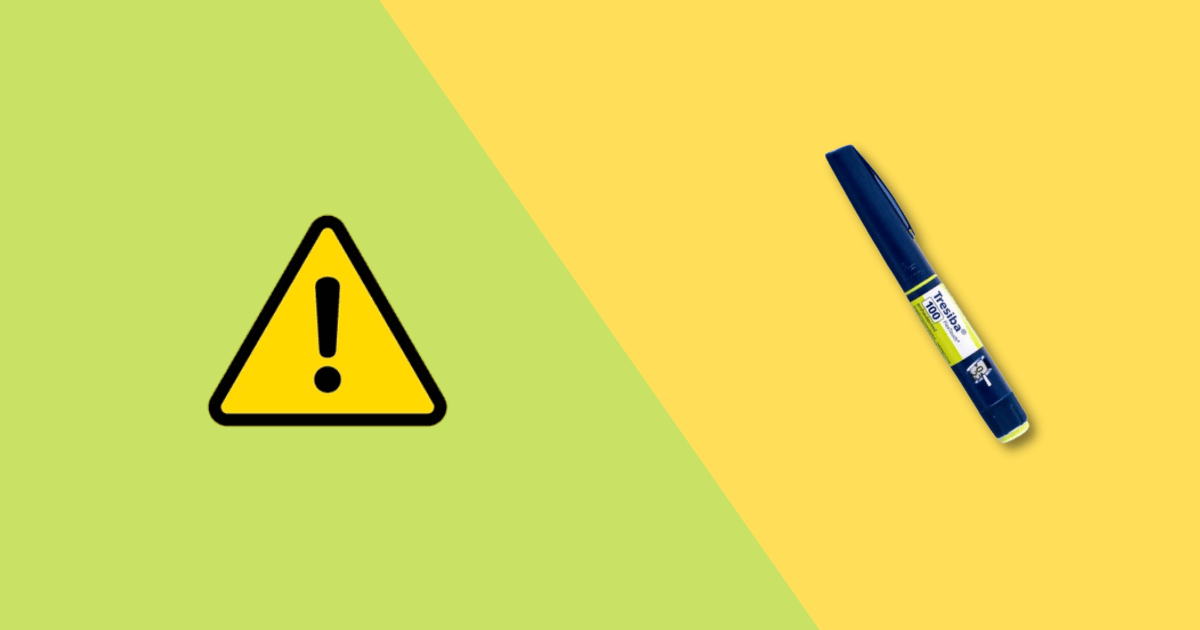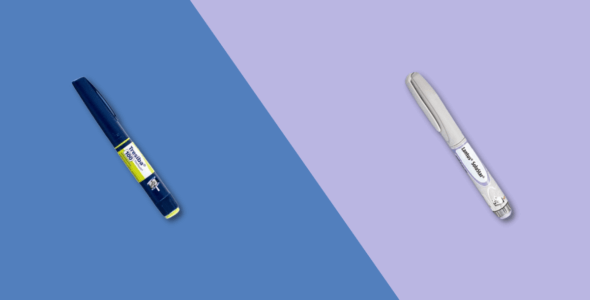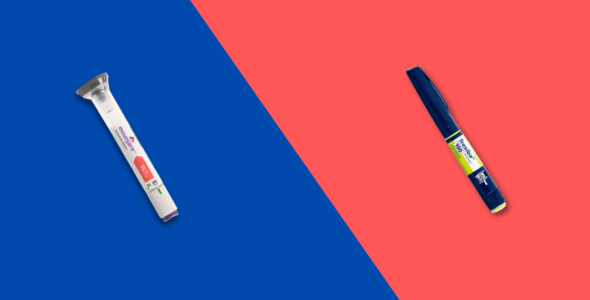Tresiba side effects and how to avoid them
Table of contents
Tresiba is an FDA-approved brand-name medication manufactured by Novo Nordisk Pharmaceuticals, Inc. It is classified as a long-acting insulin used to help manage blood sugar levels in patients with diabetes. While Tresiba is generally well tolerated, there are some potential side effects that people should be aware of. The most common side effects of Tresiba include injection site reactions. Less common but more serious side effects can include serious allergic reactions.
Learn more about the side effects of Tresiba and what you can do to avoid them.
What is Tresiba (insulin degludec)?
Tresiba contains insulin degludec, a once-daily, long-acting type of insulin indicated to improve glycemic control in patients 1 year of age and older with diabetes mellitus. It helps lower high blood sugar by maintaining balanced blood glucose levels. Tresiba may be prescribed to patients with Type 1 diabetes or Type 2 diabetes, but it is not recommended for patients with diabetic ketoacidosis.
Tresiba dosage
Tresiba is available as a 3 mL single-use FlexTouch prefilled pen, 10 mL multiple dose vials, and 3 mL single-use Tresiba FlexTouch prefilled pens.
Inject Tresiba under your skin (subcutaneous) in your upper arm, abdomen, or thigh. Rotate injection sites to reduce the risk of lipodystrophy. Administer subcutaneously once daily at any time of day. Your insulin dose may need to change because of a change in the level of physical activity or exercise, increased stress, change in diet, weight gain or loss, or illness. If you miss a dose, use the missed dose as soon as you remember. Then continue your regular dosing schedule, allowing at least 8 hours to pass between doses. Do not use two doses at one time.
Refrigerate unopened Tresiba and use until the expiration date, or store at room temperature and use within 8 weeks. Refrigerate or store opened Tresiba at room temperature and use within 8 weeks.
Please read the full prescribing information for the complete drug information, and always speak with your healthcare provider for medical advice or about any changes to your dose so they can monitor and evaluate your condition.
Is it better to take Tresiba in the morning or at night?
Adults may use Tresiba at any time of the day. Children should be given Tresiba at the same time every day.
Tresiba side effects
The most common possible side effects of Tresiba include:
- Hypoglycemia
- Allergic reactions
- Injection site reactions
- Lipodystrophy
- Pruritus, rash, edema, and weight gain
More serious long-term side effects of Tresiba include
- Hyperglycemia (high blood sugar), or hypoglycemia (low blood sugar levels)
- Serious allergic reactions – trouble breathing, fast heartbeat, swelling of your face, lips, tongue, or throat
- Severe hypoglycemia that may be life-threatening
- Severe life-threatening hypersensitivity reactions
- Hypokalemia (low potassium levels) – leg cramps, irregular heartbeats, increased thirst or urination, tiredness, muscle weakness, shakiness, or limp feeling
- Fluid retention and heart failure with concomitant use of thiazolidinediones
If you experience any of these serious side effects, stop taking Tresiba and seek medical attention immediately. You are encouraged to report the negative side effects of prescription drugs to the FDA. Visit www.fda.gov/medwatch, or call 1-800-FDA-1088.
Does Tresiba cause hair loss?
Hair loss is not a side effect of Tresiba. Speak to your doctor if you experience hair loss while using Tresiba.
Does Tresiba cause weight gain?
Yes. Tresiba can cause weight gain. Weight loss is not a side effect of Tresiba. Speak to your doctor for medical advice if you lose weight while taking Tresiba.
Does Tresiba cause anxiety?
Tresiba may cause hypoglycemia, a symptom of which can be anxiety. Speak to your doctor if you experience this side effect.
Does Tresiba cause heart failure?
Tresiba can cause heart failure if taken with thiazolidinediones (such as pioglitazone and rosiglitazone). Speak to your healthcare provider for medical advice if you are using both treatments.
Does Tresiba affect your kidneys?
Tresiba may cause hypoglycemia (low blood sugar levels), the risk of which is increased if you have kidney problems. Your doctor may need to change your dose if you have either of these problems.
Does Tresiba cause stomach pain?
Stomach pain is not a side effect of using Tresiba.
Tresiba drug interactions
Tresiba can interact with other medications, including:
- Drugs that affect glucose metabolism
- Anti-adrenergic drugs such as beta-blockers, clonidine, guanethidine, and reserpine
- Other diabetes medications
Before taking Tresiba, be sure to tell your doctor about all of the medications you are taking to ensure they are safe to take at the same time.
Tresiba warnings & precautions
You should not use Tresiba if you:
- Are allergic to the active ingredient insulin degludec
- Are allergic to any of the other ingredients in Tresiba
- Are having an episode of hypoglycemia
- Drink alcohol or use prescription or over-the-counter medicines that contain alcohol
Talk to your doctor before using Tresiba if you:
- Are taking any of the medications that could interact with Tresiba
- Are pregnant or are planning to become pregnant
- Are breastfeeding or are planning to breastfeed
You should always check with your doctor or pharmacist before taking any medication, including Tresiba, to make sure it is safe for you.
Tresiba vs Lantus
Tresiba and Lantus are both long-acting insulins available in similar forms with similar side effects. The only real difference is in how long they work in the body. Tresiba will work for up to 42 hours, while Lantus will work for up to 24 hours.
How to avoid Tresiba side effects
The best way to avoid side effects is to take Tresiba as directed by your doctor. Follow your doctor’s instructions carefully, and do not take more or less than prescribed.
If you experience any side effects, talk to your doctor or pharmacist. They may be able to recommend ways to help reduce or prevent some of the side effects.
1. Stick to the recommended dosage
Take your prescribed dose of Tresiba that has been recommended by your healthcare professional. Do not take more or less than prescribed.
2. Monitor your blood sugar levels
If you have diabetes, it is important to monitor your blood sugar levels closely while taking Tresiba. Check your blood sugar levels as directed by your doctor and report any changes to your doctor immediately.
3. Drink plenty of fluids
Drink eight to 10 glasses of water or fluids every day to help prevent dehydration, which can make side effects worse.
4. Avoid alcohol
Avoid drinking alcohol while taking Tresiba as it can increase your risk of hypoglycemia.
5. Don’t skip meals
Eating regular meals and snacks will help to prevent low blood sugar levels (hypoglycemia).
6. Check your feet
If you have diabetes, check your feet for any cuts, sores, or redness regularly. Tell your doctor if you experience any problems with your feet while taking Tresiba.
7. Know the signs and symptoms of Tresiba side effects
Signs and symptoms of side effects include hypoglycemia, allergic reactions, and weight gain. If you experience any of these symptoms, speak to your doctor for medical advice.
8. Tell your doctor about all medications you’re taking
Be sure to tell your doctor about all other medications you’re taking, including over-the-counter drugs, vitamins, and herbal supplements, as they can interact with Tresiba.
9. Get regular medical checkups
It is important to get regular medical checkups and monitor your medical conditions. Your doctor will monitor your condition and may adjust your dose of Tresiba as needed.
Medically reviewed
A medical professional has reviewed this article.


Jamie Winn, PharmD
Jamie Winn, PharmD
Dr. Jamie Winn received his Doctor of Pharmacy in 2002 from the University of South Carolina College of Pharmacy, Columbia, SC. Jamie is a medical reviewer for NiceRx.



